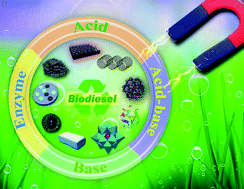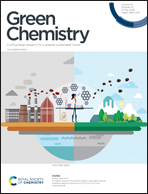Functionalized magnetic nanosized materials for efficient biodiesel synthesis via acid–base/enzyme catalysis
Abstract
According to the principles of green chemistry, the rapid recovery and reuse of catalysts after a catalytic reaction are important factors to realize the sustainable management of chemical production processes. The functionalization of magnetic nanoparticles is the basis for the efficient separation of heterogeneous catalysts from the reaction system by using the magnetic separation technology as well as for effectively bridging heterogeneous and homogeneous catalytic processes. This can considerably improve the production efficiency and reduce energy consumption as well. Owing to important applications as a potential biofuel or fuel additive, the synthesis of biodiesel mainly from low-cost biomass feedstocks has received considerable attention in the current biorefinery research. A simple synthesis process coupled with the application of functionalized magnetic catalysts can remarkably reduce the production cost and minimize waste generation, thereby promoting the potential development of green catalytic processes for the large-scale synthesis of biodiesel. In this review, the preparation methods, structural and performance control, and protection and functionalization of magnetic nanoparticles as well as the consequent catalytic effects in the synthesis of biodiesel (mainly long-chain fatty acid methyl esters) have been reported. In addition, various representative reaction mechanisms are discussed, emphasizing the existing challenges and prospects of industrialization.



 Please wait while we load your content...
Please wait while we load your content...